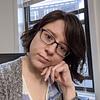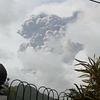Take a photo of a barcode or cover
This is a superb conclusion to a superb series: turning everything up to eleven, but in a much smarter way than the average fantasy trilogy. Characters with both overwhelming competence and interesting souls, new categories of magic, new categories of awfulness from the past. Absolutely splendid series, everyone should read it!
I don’t think this was as sociopolitically interesting as the first two, and I could see why someone might consider it weaker because of that, but I didn’t really care because I thought it was a ton of fun. Bennett manages to make even a trying-to-destroy-the-world antagonist really cool and interesting, Sigrud is a total badass as expected, and there was a lot here that I found emotionally compelling as well.
challenging
emotional
mysterious
reflective
tense
medium-paced
Plot or Character Driven:
A mix
Strong character development:
Yes
Loveable characters:
Complicated
Diverse cast of characters:
Complicated
Flaws of characters a main focus:
Yes
adventurous
challenging
dark
emotional
mysterious
tense
medium-paced
Plot or Character Driven:
A mix
Diverse cast of characters:
Yes
Flaws of characters a main focus:
Yes
adventurous
challenging
dark
emotional
sad
tense
medium-paced
Plot or Character Driven:
A mix
Strong character development:
Yes
Loveable characters:
Yes
Diverse cast of characters:
Yes
Flaws of characters a main focus:
Yes
adventurous
tense
fast-paced
Plot or Character Driven:
A mix
Strong character development:
Yes
Loveable characters:
Yes
Diverse cast of characters:
Yes
Flaws of characters a main focus:
Complicated
The third volume of the author's theofictional trilogy focuses on the attempts by one of the surviving divine children to wreak vengeance on his mother(s) and, as in the way of these things, everyone else. The hero, who has, somewhat accidentally, also acquired some characteristics of the divine, is a member of the original triad that were introduced in the first volume. Like his companion of the second volume, he comes to regret having been a man of violence - and does indeed kill rather less people than in earlier episodes of the saga.
Once again the story is quite deftly woven. There's a bit too much of the Silver Surfer syndrome for my liking, but it's a read.
Once again the story is quite deftly woven. There's a bit too much of the Silver Surfer syndrome for my liking, but it's a read.
A brilliant end to an amazing series.
It's many years after the events of [b:City of Blades|23909755|City of Blades (The Divine Cities, #2)|Robert Jackson Bennett|https://images.gr-assets.com/books/1426255519s/23909755.jpg|43516764]. Sigrud is living in hiding in a logging settlement and Shara has been Prime Minister of Saypur and was living an active retirement until she is assassinated, apparently with Divine help. With Shara's death Sigrud descends on the perpetrators like an avenging angel only to discover the extent of Shara's activity in recent years and her adopted daughter. Sigrud finds himself up to the eyeballs in unresolved matters of the Divine again with the fate of the whole world in balance.
In the first two books Sigrud was something of a blunt instrument, and to be completely fair, he's still very much that. In this he finds himself the general rather than the foot soldier, and like everything he does, he excels, but he'll need to be more than just an unstoppable force to deal with the Divine.
I very much like the growth in Sigrud here and his exposure to Shara's adopted daughter is also brilliant. I also continue to be impressed at the way that Bennett shows his antagonists in this series as just as much victims as those they oppress, and the eventual resolution is very fitting. While the Divine Cities is clearly done with this story, the world that is left at the end would be a fascinating setting going forward.
One comment about the series as a whole is how similar in overall structure these are to [a:N.K. Jemisin|2917917|N.K. Jemisin|https://images.gr-assets.com/authors/1438215930p2/2917917.jpg]'s Inheritance trilogy. This one in particular really brought that home for me.
Highly recommended. The series has no low points.
It's many years after the events of [b:City of Blades|23909755|City of Blades (The Divine Cities, #2)|Robert Jackson Bennett|https://images.gr-assets.com/books/1426255519s/23909755.jpg|43516764]. Sigrud is living in hiding in a logging settlement and Shara has been Prime Minister of Saypur and was living an active retirement until she is assassinated, apparently with Divine help. With Shara's death Sigrud descends on the perpetrators like an avenging angel only to discover the extent of Shara's activity in recent years and her adopted daughter. Sigrud finds himself up to the eyeballs in unresolved matters of the Divine again with the fate of the whole world in balance.
In the first two books Sigrud was something of a blunt instrument, and to be completely fair, he's still very much that. In this he finds himself the general rather than the foot soldier, and like everything he does, he excels, but he'll need to be more than just an unstoppable force to deal with the Divine.
I very much like the growth in Sigrud here and his exposure to Shara's adopted daughter is also brilliant. I also continue to be impressed at the way that Bennett shows his antagonists in this series as just as much victims as those they oppress, and the eventual resolution is very fitting. While the Divine Cities is clearly done with this story, the world that is left at the end would be a fascinating setting going forward.
One comment about the series as a whole is how similar in overall structure these are to [a:N.K. Jemisin|2917917|N.K. Jemisin|https://images.gr-assets.com/authors/1438215930p2/2917917.jpg]'s Inheritance trilogy. This one in particular really brought that home for me.
Highly recommended. The series has no low points.
What a tremendous sin impatience is, he thinks. It blinds us to the moment before us, and it is only when that moment has passed that we look back and see it was full of treasures.
But freedom and human happiness has a direct relationship to the number of people who have power over their own world, their own lives. Far too many people still have no say in how they live. The more power is dispersed, the more that will change.
Everything about this was just amazing, all three of the books were incredible - each book's narrator brought a new and different perspective, while still tying the threads of the series together. I want more books in this universe immediately.
But freedom and human happiness has a direct relationship to the number of people who have power over their own world, their own lives. Far too many people still have no say in how they live. The more power is dispersed, the more that will change.
Everything about this was just amazing, all three of the books were incredible - each book's narrator brought a new and different perspective, while still tying the threads of the series together. I want more books in this universe immediately.



